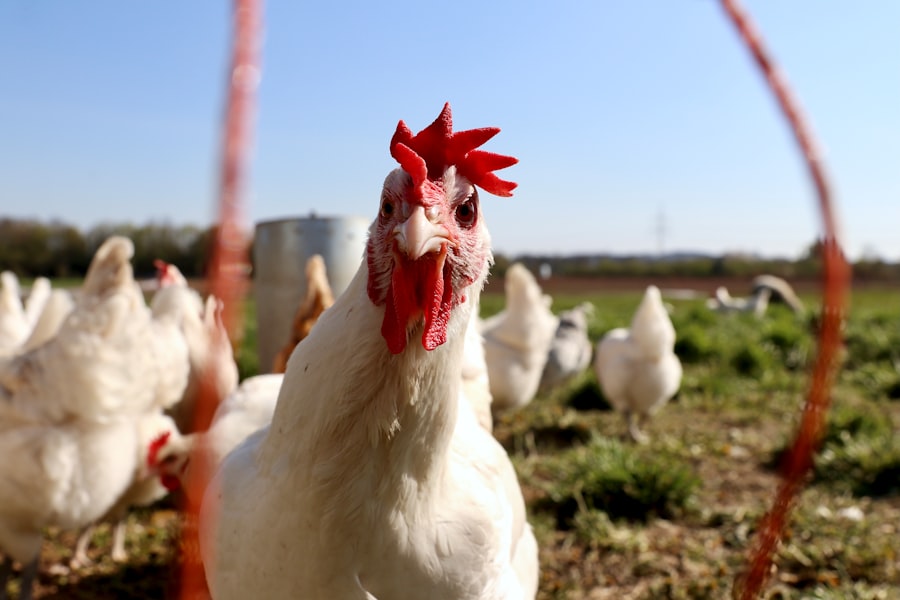Keeping chickens has a long history in Australia, dating back to the early days of European settlement. Chickens were brought to the country by the first European settlers as a source of food and have since become a popular hobby for many Australians. Today, people keep chickens for a variety of reasons, including fresh eggs, fertilizer for the garden, pest control, and companionship.
Key Takeaways
- Keeping chickens in Australia has become increasingly popular in recent years.
- Benefits of keeping chickens include fresh eggs, natural pest control, and fertilizer for gardens.
- When choosing a breed of chicken, consider factors such as egg production, temperament, and climate adaptability.
- Setting up a chicken coop requires proper ventilation, insulation, and predator-proofing.
- Maintaining a clean and healthy chicken coop involves regular cleaning, providing fresh water and food, and monitoring for signs of illness.
Benefits of Keeping Chickens
One of the main benefits of keeping chickens is the availability of fresh eggs. There is nothing quite like collecting eggs from your own backyard and enjoying them for breakfast. Not only are fresh eggs delicious, but they are also healthier than store-bought eggs. Chickens that are allowed to roam and forage for their food produce eggs that are higher in omega-3 fatty acids and vitamins A and E.
Another benefit of keeping chickens is the fertilizer they provide for your garden. Chicken manure is rich in nitrogen, phosphorus, and potassium, which are essential nutrients for plant growth. By adding chicken manure to your garden, you can improve soil fertility and promote healthy plant growth.
Chickens also help control pests in your garden. They love to eat insects, slugs, snails, and other pests that can damage your plants. By allowing your chickens to free-range in your garden, you can reduce the need for chemical pesticides and keep your plants healthy.
Lastly, chickens can provide companionship. They have unique personalities and can be quite entertaining to watch. Many people find joy in spending time with their chickens and forming a bond with them.
Choosing the Right Breed of Chicken
When choosing a breed of chicken, there are several factors to consider. First, you need to think about the climate in your area. Some breeds are better suited to hot climates, while others are more cold-hardy. It’s important to choose a breed that can tolerate the temperature extremes in your region.
You should also consider the purpose for which you are keeping chickens. If you primarily want them for egg production, then you will want to choose a breed that is known for its laying abilities. On the other hand, if you are more interested in meat production, then you will want to choose a breed that grows quickly and has good meat quality.
Some popular chicken breeds in Australia include the Australorp, Rhode Island Red, and Isa Brown. These breeds are known for their excellent egg-laying abilities and are well-suited to the Australian climate.
When it comes to buying chickens, there are several options available. You can purchase them from a local breeder or hatchery, or you can order them online. It’s important to choose a reputable source to ensure that you are getting healthy birds.
Setting Up a Chicken Coop
Before bringing home your chickens, you will need to set up a chicken coop. The coop should provide shelter, security, and comfort for your chickens. It should also be easy to clean and maintain.
When choosing a location for your coop, it’s important to consider factors such as sunlight, shade, and protection from predators. The coop should be placed in an area that receives plenty of sunlight during the day but also has some shade for hot summer days. It should also be located away from trees or structures that could provide access for predators.
The size of the coop will depend on the number of chickens you plan to keep. As a general rule of thumb, each chicken should have at least 4 square feet of space inside the coop and 10 square feet of space in the outdoor run.
When it comes to materials, you can choose between wood or metal for the frame of the coop. Wood is a popular choice because it is easy to work with and provides good insulation. However, metal coops are more durable and resistant to predators.
Basic construction tips for building a chicken coop include ensuring that the coop is well-ventilated to prevent the buildup of moisture and ammonia. It’s also important to provide adequate roosting space for your chickens, as well as nesting boxes for them to lay their eggs.
Designing a Chicken Coop
When designing a chicken coop, there are several features that you should include to ensure the comfort and well-being of your chickens.
First, you will need to provide nesting boxes for your hens to lay their eggs. Each hen should have her own nesting box, which should be filled with clean straw or wood shavings. The nesting boxes should be located in a quiet and dark area of the coop to provide privacy for the hens.
Next, you will need to provide perches or roosts for your chickens to sleep on. Chickens naturally like to roost off the ground, so it’s important to provide them with a comfortable place to do so. The perches should be made of smooth wood and should be placed at different heights to accommodate all of your chickens.
Ventilation is also an important consideration when designing a chicken coop. Good ventilation helps remove moisture and ammonia from the coop, which can lead to respiratory problems in chickens. You can achieve good ventilation by including windows or vents in the coop design.
Lastly, you will need to provide lighting in the coop. Chickens need a certain amount of light each day to lay eggs consistently. You can use natural light or artificial lighting to ensure that your chickens receive enough light.
Maintaining a Clean and Healthy Chicken Coop

Maintaining a clean and healthy chicken coop is essential for the well-being of your chickens. A clean coop helps prevent the spread of disease and keeps your chickens comfortable.
Regular cleaning is important to remove droppings, feathers, and other debris from the coop. You should clean the coop at least once a week, but more often if necessary. Remove all bedding material from the nesting boxes and replace it with fresh material. Scrub the walls and floor of the coop with a mild detergent and rinse thoroughly.
In addition to regular cleaning, it’s important to keep an eye out for any signs of illness in your chickens. Common health issues in chickens include respiratory infections, parasites, and egg-laying problems. If you notice any unusual behavior or symptoms in your chickens, it’s important to seek veterinary advice.
Preventing health issues in your chickens starts with good biosecurity measures. This includes keeping your coop clean and free from pests, quarantining new birds before introducing them to your flock, and practicing good hygiene when handling your chickens.
Feeding Your Chickens
Feeding your chickens a balanced diet is essential for their health and productivity. Chickens require a diet that is high in protein, vitamins, and minerals.
There are several types of feed available for chickens, including pellets, crumbles, and mash. Pellets are a popular choice because they are easy to feed and provide a balanced diet. Crumbles are similar to pellets but are smaller in size, making them suitable for young chicks. Mash is a finely ground feed that can be mixed with water to form a paste.
The amount of feed you should give your chickens will depend on their age and size. As a general rule of thumb, adult chickens should be fed about 1/4 to 1/2 cup of feed per day. It’s important not to overfeed your chickens, as this can lead to obesity and other health problems.
In addition to their regular feed, you can also give your chickens treats and supplements. Treats can include fruits, vegetables, grains, and mealworms. Supplements such as calcium or grit can help support egg production and digestion.
Health and Safety Considerations for Your Chickens
When keeping chickens, it’s important to be aware of potential health and safety risks. Predators such as foxes, snakes, and birds of prey can pose a threat to your chickens. It’s important to secure your coop with sturdy fencing and locks to prevent access by predators.
Common injuries in chickens include cuts, scrapes, and broken bones. If you notice any injuries in your chickens, it’s important to provide first aid and seek veterinary advice if necessary. Keeping your coop clean and free from sharp objects can help prevent injuries.
Biosecurity measures are also important to prevent the spread of disease in your flock. This includes quarantining new birds before introducing them to your flock, practicing good hygiene when handling your chickens, and regularly disinfecting the coop.
Egg Production and Collection
Chickens typically start laying eggs at around 5 to 6 months of age. The frequency of egg production will depend on the breed and individual hen. Most hens will lay an egg every 1 to 2 days during their peak laying period.
To ensure that your hens lay healthy eggs, it’s important to provide them with a balanced diet, clean water, and a comfortable nesting area. You should also check for any signs of illness or stress in your hens, as this can affect egg production.
When collecting eggs, it’s important to handle them with care to avoid cracking or damaging the shells. Eggs should be collected daily and stored in a cool place until they are ready to be used. It’s important not to wash eggs unless necessary, as this can remove the protective coating on the shell.
Troubleshooting Common Chicken Problems
While keeping chickens can be a rewarding experience, it’s not without its challenges. Here are some common problems that chicken keepers may encounter:
– Egg-laying issues: Some hens may experience problems with egg-laying, such as soft-shelled eggs or egg-binding. These issues can be caused by nutritional deficiencies, stress, or underlying health problems. It’s important to address any issues promptly and seek veterinary advice if necessary.
– Aggression and bullying: Chickens have a pecking order, and sometimes aggression and bullying can occur within the flock. This can lead to injuries and stress in the affected chickens. Providing enough space, perches, and hiding spots can help reduce aggression.
– Molting: Molting is a natural process in which chickens shed their old feathers and grow new ones. During this time, chickens may stop laying eggs and appear scruffy. Providing a balanced diet and extra protein can help support healthy feather growth.
– Respiratory problems: Chickens are susceptible to respiratory infections, which can be caused by bacteria, viruses, or parasites. Symptoms of respiratory problems include coughing, sneezing, wheezing, and nasal discharge. It’s important to seek veterinary advice if you suspect a respiratory infection.
Keeping chickens can be a fun and rewarding hobby for anyone with a bit of outdoor space. By following these tips, you can ensure that your chickens are happy, healthy, and productive. Whether you are interested in fresh eggs, fertilizer for your garden, pest control, or companionship, chickens can provide all of these benefits and more. So why not give chicken keeping a try? You may just find yourself falling in love with these feathered friends.
If you’re a beginner looking to start keeping chickens in Australia, you’ll definitely want to check out this helpful article on choosing the right chicken coop. The article discusses different types of coops, including the Chicken Coop Grand Island NE, the Snaplock Chicken Coop, and the Garden Chicken Coop. Each coop has its own unique features and benefits, so it’s important to understand which one would be the best fit for your needs. To learn more about these coops and make an informed decision, click here.
FAQs
What are the benefits of keeping chickens?
Keeping chickens can provide a source of fresh eggs, natural pest control for your garden, and can be a fun and educational hobby for families.
What do I need to consider before getting chickens?
You should consider the amount of space you have available, local council regulations, and the time and effort required to care for chickens.
What kind of housing do chickens need?
Chickens need a secure coop to sleep in at night, with enough space for them to move around comfortably. They also need access to a run or fenced area during the day.
What do chickens eat?
Chickens need a balanced diet of grains, protein, and fresh fruits and vegetables. You can purchase commercial chicken feed or create your own mix.
How often do I need to clean the coop?
You should clean the coop at least once a week, removing any soiled bedding and replacing it with fresh material. You should also clean and sanitize the coop periodically to prevent the spread of disease.
What health issues should I be aware of?
Chickens can be susceptible to a variety of health issues, including parasites, respiratory infections, and egg-laying problems. It’s important to monitor your chickens’ health and seek veterinary care if necessary.
Do I need a rooster to get eggs?
No, you do not need a rooster to get eggs. Hens will lay eggs regardless of whether or not there is a rooster present. However, if you want fertilized eggs to hatch chicks, you will need a rooster.
Meet Walter, the feathered-friend fanatic of Florida! Nestled in the sunshine state, Walter struts through life with his feathered companions, clucking his way to happiness. With a coop that’s fancier than a five-star hotel, he’s the Don Juan of the chicken world. When he’s not teaching his hens to do the cha-cha, you’ll find him in a heated debate with his prized rooster, Sir Clucks-a-Lot. Walter’s poultry passion is no yolk; he’s the sunny-side-up guy you never knew you needed in your flock of friends!







